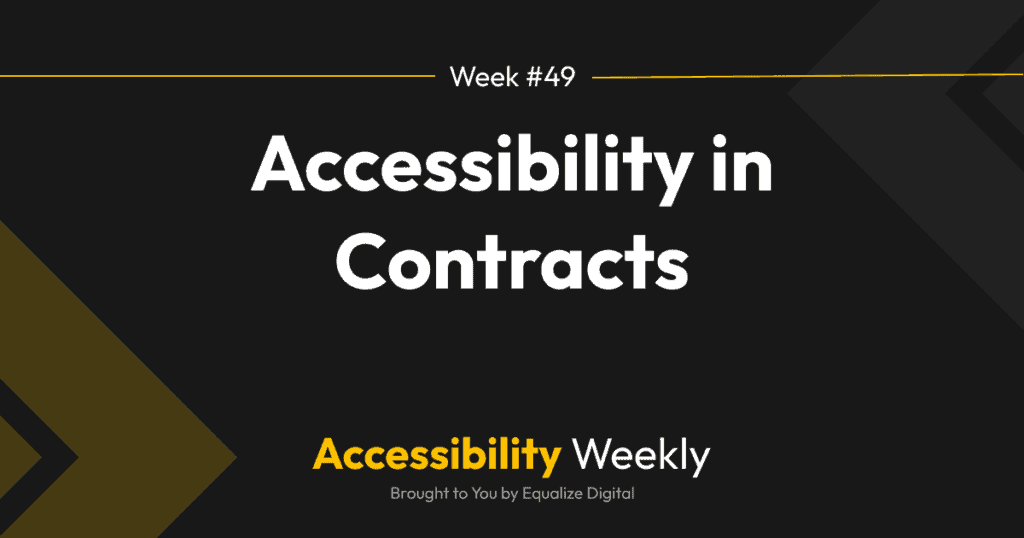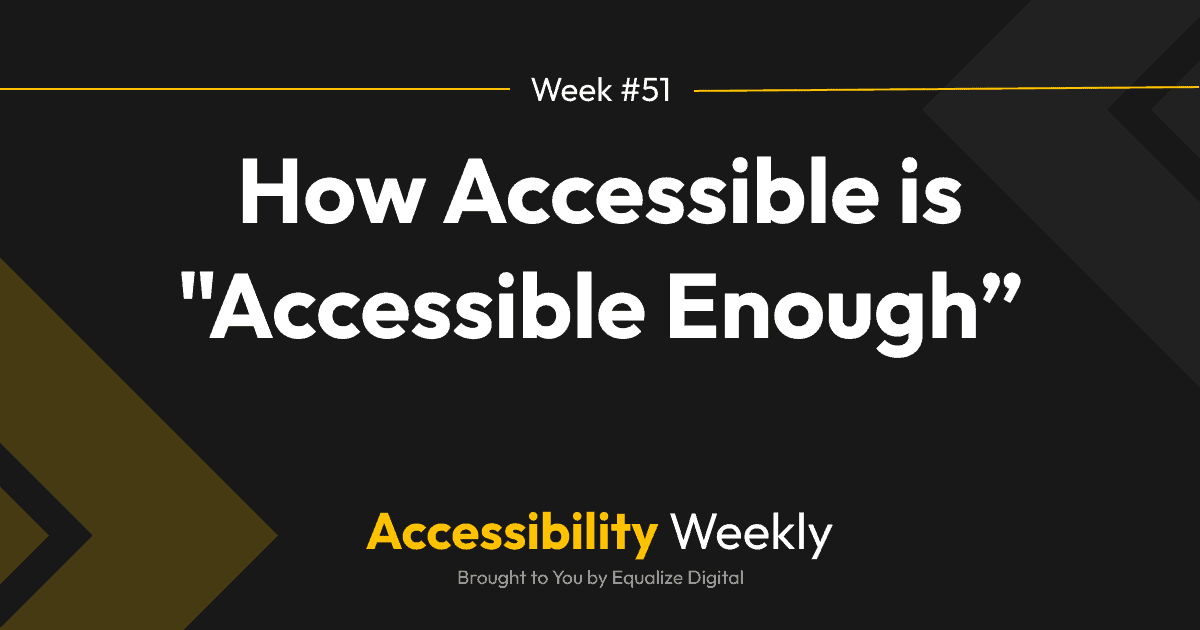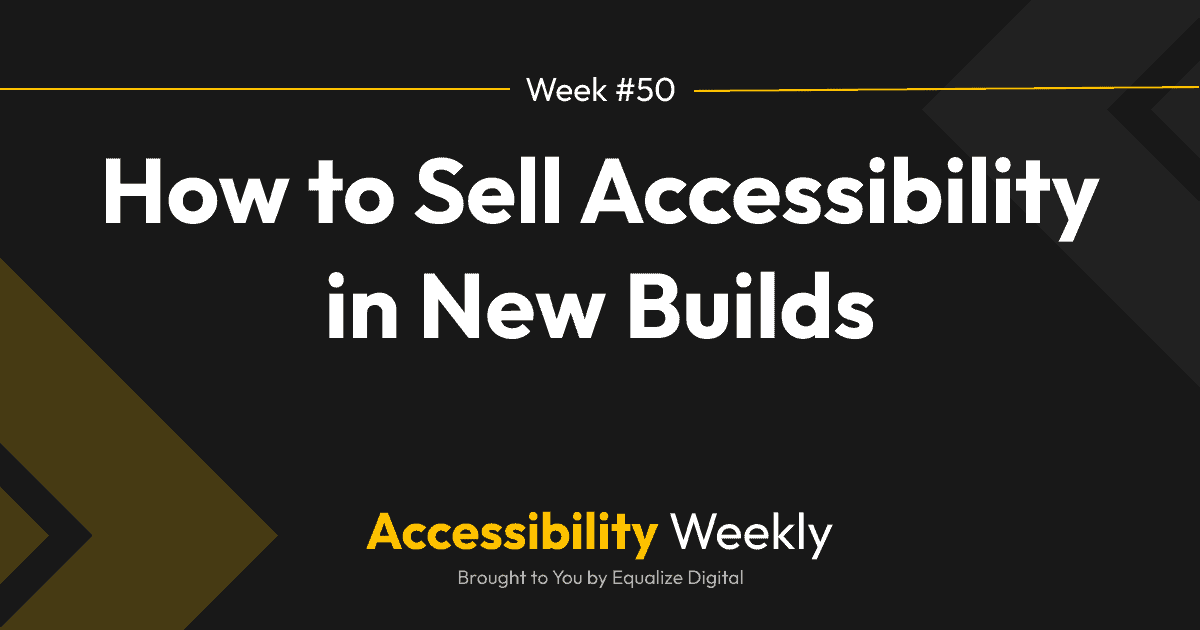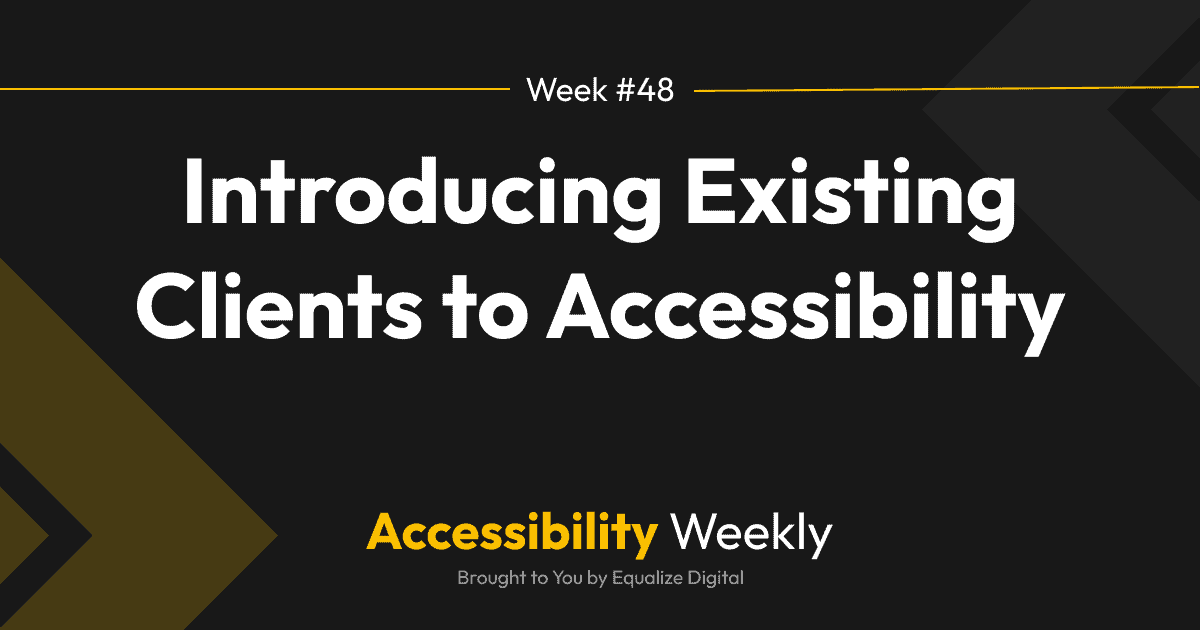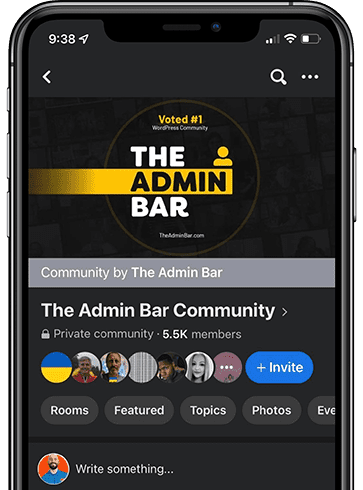Whether you’re running an agency or freelancing, having a clear contract for your web development and maintenance services is crucial. As with any other offering or guarantee, your contract should explicitly outline accessibility services and deliverables. This is especially important because laws frequently cover website accessibility.
While I’m not a lawyer and can’t give legal advice, this post contains information about my company, Equalize Digital’s contracts, and other advice our attorneys provided us. Use it as inspiration to start discussions with your attorney and refine the language in your contracts.
Background Information
There are three areas where language around accessibility can impact your client’s understanding of what you’re delivering:
- The marketing language on your website.
- The proposal you use to sell clients the work.
- The contract consists of two parts: Terms of Service (typically general and applies to everyone) and a Statement of Work (specific to one project).
You need to consider how you write about accessibility in these three places.
Don’t Promise Compliance With Laws
As mentioned in last week’s article, “Introducing Existing Clients to Accessibility,” it’s essential to be honest about what you’re capable of delivering and not to promise compliance with laws. This applies to the marketing language on your website and in your proposals.
As my attorneys said to me, “If you’re not a judge, you can’t guarantee that something complies with a law.” Also, there are many laws around the world, such as the Americans with Disabilities Act (ADA), that don’t have clearly defined standards for proving compliance, so “compliance” is a very gray area.
With this in mind, you want to be clear about what you mean by accessibility and how you can help the client meet requirements under the laws. Emphasis on the client (not you) needing to ensure compliance with the law. Typically, you’ll want to reference the Web Content Accessibility Guidelines (WCAG). WCAG is a standard frequently referenced by laws but is not a law itself.
Language and wording matter here. Here’s an example.
Don’t Say
“Equalize Digital will make your website ADA-compliant.”
Do Say
“Equalize Digital will ensure your website meets WCAG, which can help you meet requirements under the Americans With Disabilities Act (ADA).”
Why is this better? This second statement is better because it promises the website will meet WCAG standards rather than any laws, and it references the ADA but under the framework of WCAG helping them meet the law. Also, it puts the onus on the reader, not you. Ultimately, the website owner is responsible for meeting the law, and WCAG may only be a part of that. ****
If you already have marketing language on your website about accessibility services, make sure your language doesn’t over-promise regarding accessibility laws. Otherwise, you could find yourself at the end of a lawsuit from an unhappy client who got sued for accessibility issues on their website and thought you were promising a legally compliant website.
Terms of Service
In your Terms of Service (a.k.a., contract), you must clearly define what you mean by accessibility.
Here’s what we have in our contract related to accessibility. You can view Equalize Digital’s Terms of Service on our website if you want to read the whole contract or see how the pieces fit together.
General Definitions
There are two definitions in our definitions section related to accessibility:
“Laws” shall mean all applicable local, state, federal, and international laws and regulations related to accessibility.
“WCAG” shall mean the Web Content Accessibility Guidelines developed by the World Wide Web Consortium.
Compliance With Laws
The first paragraph in this section is relevant to the advice we give on accessibility and advice we might give related to privacy laws, tax collection, etc. It’s broad enough to cover any advice the client might construe as legal advice. The second paragraph defines the compliance standard we use.
Not a Law Office. Client understands that Company is not a law office, Company’s employees are not attorneys, and Company does not practice law. Client should not use Company as their sole source of information related to compliance with Laws and should always retain their own legal counsel.
Compliance Standards. The Parties recognize that Laws governing web accessibility are numerous and the regulatory environment is changing rapidly. The Parties further agree that the accessibility of any Site or Deliverable will be measured against WCAG (Web Content Accessibility Guidelines). Due to the rapidly changing legal landscape, Company can not guarantee that conforming with WCAG equates to compliance with the Americans with Disabilities Act (ADA), Section 508, or any other applicable Laws. Not withstanding the foregoing and absent more concrete regulatory guidance in the future, Company believes that WCAG is the best accessibility standard for most organizations to adhere to.
Statement of Work
The Statement of Work for each project clearly states the website areas we guarantee will be accessible (measured against WCAG).
We never guarantee that an entire website will be accessible because we’re frequently importing in a lot of client-created content (old posts, products, etc.), and we’re not going to promise something will be accessible if we do not create or look at it. This seems logical, but you need to spell this out for clients.
Here’s the language from the Accessibility section of our Statement of Work:
As detailed further in Company’s Terms of Service, the Parties agree that the accessibility of any Site or Deliverable will be measured against WCAG (Web Content Accessibility Guidelines). Provided that they were first developed, coded, or assembled by Company, the following parts of the deliverable will conform to WCAG 2.1 AA: (1) header, footer, and sidebars; (2) web forms; (3) web pages that Company assembled manually; and (4) front-end elements controlled solely by the template and not content areas.
Company can also manually review and correct additional posts or pages that it did not develop, code, or assemble.
The following area(s) will receive additional testing and analysis beyond what is normally covered, as described earlier in this section:
[Numbered list of additional things the client has paid extra to have us test and remediate goes here.]
Excluding Accessibility in Contracts
What if you don’t build accessible websites? If you’re not yet including accessibility in your projects or are only doing limited automated testing, you may want to state that to protect yourself from future complaints.
A side benefit of explicitly excluding accessibility is it may open the door to an upsell because some clients will not want it excluded.
Here are two examples that I generated with the help of ChatGPT. (A.K.A., my attorneys did not write these as they did the previous examples, and they likely need adjustment by a legal professional.)
Example Accessibility Exclusion Clause
The Parties agree that Accessibility services, including but not limited to adherence to Web Content Accessibility Guidelines (WCAG) or other accessibility standards, are expressly excluded from this scope of work. Should Client require accessibility services for the website, a separate agreement must be reached between the Parties. This agreement will detail the specific accessibility services to be provided, associated costs, and any additional terms or conditions related to accessibility requirements.
Client acknowledges that it is responsible for ensuring the website’s compliance with accessibility laws, regulations, or standards applicable to their business or jurisdiction. Company will not be held liable for any legal consequences arising from the website’s non-compliance with accessibility requirements unless explicitly agreed upon in a separate accessibility agreement.
Example Limited Accessibility Clause
Company uses automated testing tools to identify and address potential accessibility issues during the development process and will use a good faith effort to follow best practices for useability. However, the Parties agree that Company and its employees or subcontractors are not accessibility experts. As such, Client understands and agrees that Company cannot guarantee full WCAG compliance or compliance with any Laws.
Ask an Attorney
If you do some sleuthing, you can frequently find other companies’ Terms of Service on the web to reference. However, the best resource for knowing you have rock-solid accessibility language in your contracts is to ask an attorney.
If you haven’t yet had an attorney create or review your contracts, it’s a wise investment to put in your budget for 2024. Not just to ensure you have your bases covered on accessibility but also for all terms and conditions you’re including on your services.
Join the Conversation!
There's a dedicated thread on this post inside of The Admin Bar community. Join in on the conversation, ask questions, and learn more!
Group Thread

